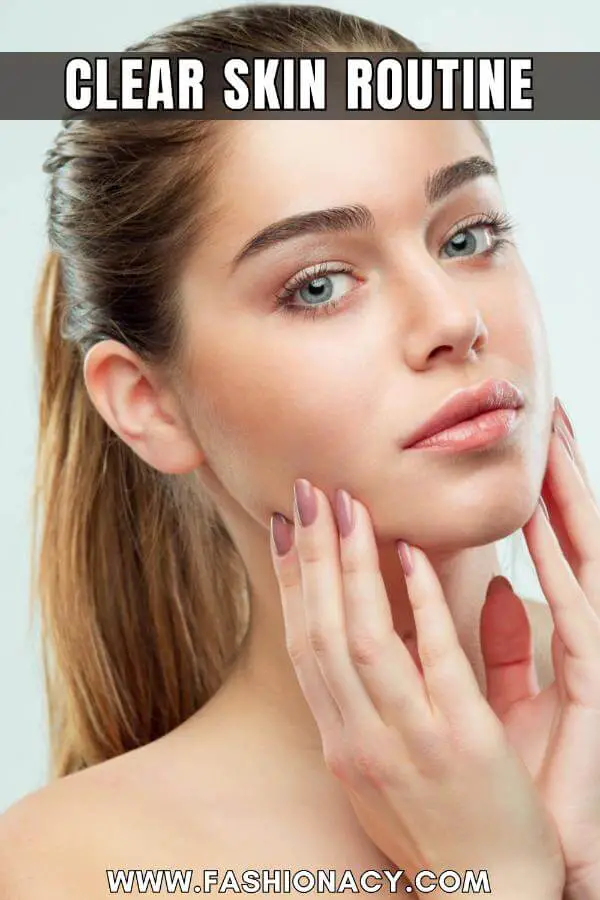
Clear and radiant skin is a goal that many aspire to achieve. While genetics play a role in determining skin type, there are numerous lifestyle changes, skincare routines, and habits that can contribute to achieving and maintaining clear skin.
In this comprehensive guide, we will explore a variety of strategies to help you attain that coveted clear complexion.
Clear Skin Routine

A clear skin routine is a holistic approach to skincare that involves consistent practices and targeted products to achieve and maintain a healthy, radiant complexion. Clear skin is not just about treating existing issues; it’s about adopting a proactive approach that addresses the root causes of skin concerns.
Here are the essential steps and key components of an effective clear skin routine.
- Know Your Skin Type:
- Before establishing a clear skin routine, it’s crucial to understand your skin type. Whether you have oily, dry, combination, or sensitive skin, tailoring your routine to meet your specific needs is essential for success.
- Gentle Cleansing:
- Start your routine with a gentle cleanser to remove dirt, oil, and impurities without stripping your skin of its natural oils. Cleansing should be done both in the morning and before bedtime to maintain a clean canvas for skincare products.
- Exfoliation:
- Regular exfoliation is key to promoting cell turnover, preventing clogged pores, and maintaining a smooth skin texture. Use a mild exfoliator 2-3 times a week, adjusting frequency based on your skin’s sensitivity.
- Toning:
- Apply a toner to balance the skin’s pH levels and prepare it to better absorb subsequent products. Opt for a gentle, alcohol-free toner that suits your skin type.
- Targeted Treatments:
- Incorporate targeted treatments for specific skin concerns. This may include serums with ingredients like hyaluronic acid for hydration, vitamin C for brightening, or retinol for anti-aging. Choose products based on your individual needs.
- Moisturize:
- Hydration is crucial for all skin types. Use a suitable moisturizer to lock in moisture and maintain the skin’s natural barrier. Even those with oily skin benefit from lightweight, non-comedogenic moisturizers.
- Sunscreen Protection:
- Sunscreen is a non-negotiable step in any clear skin routine. UV rays can lead to premature aging, pigmentation, and skin damage. Apply a broad-spectrum SPF of at least 30 every morning, even on cloudy days.
- Consistent Application:
- Consistency is key for any skincare routine. Stick to your regimen even on days when your skin appears clear, as prevention is as important as treatment.
- Avoid Harsh Ingredients:
- Be mindful of harsh ingredients that can irritate the skin. Ingredients like alcohol, sulfates, and synthetic fragrances can strip the skin of its natural oils and cause sensitivity.
- Adjust as Needed:
- Pay attention to how your skin responds to the products in your routine. Adjustments may be necessary based on changes in climate, hormonal fluctuations, or shifts in your skin’s needs.
Clear Skin Tips

- Establish a Consistent Skincare Routine:
- Cleansing: Start with a gentle cleanser to remove dirt, oil, and makeup. Cleanse your face twice a day, morning and night.
- Exfoliation: Use a mild exfoliator 2-3 times a week to remove dead skin cells, promoting cell turnover and preventing clogged pores.
- Moisturizing: Hydrate your skin with a suitable moisturizer to maintain its natural moisture balance.
- Sunscreen: Apply a broad-spectrum SPF of at least 30 every morning to protect your skin from harmful UV rays.
- Stay Hydrated:
- Drinking an adequate amount of water is crucial for clear skin. Water helps flush out toxins, keeping your skin hydrated and promoting a healthy complexion.
- Balanced Diet:
- Consume a diet rich in fruits, vegetables, whole grains, and lean proteins. Antioxidants found in these foods help combat free radicals and support overall skin health.
- Limit the intake of processed foods, sugary snacks, and dairy products, as they can contribute to inflammation and breakouts.
- Manage Stress:
- Chronic stress can lead to hormonal imbalances, triggering acne breakouts. Practice stress-reducing activities such as meditation, yoga, or deep breathing exercises to maintain emotional well-being and clear skin.
- Adequate Sleep:
- Lack of sleep can lead to increased stress and cortisol levels, negatively impacting skin health. Aim for 7-9 hours of quality sleep each night to allow your skin to repair and regenerate.
- Avoid Touching Your Face:
- Touching your face with unwashed hands can transfer bacteria and dirt, leading to breakouts. Resist the urge to pick at pimples, as it can cause scarring and worsen inflammation.
- Choose the Right Products:
- Select skincare products that match your skin type. If you have oily skin, opt for oil-free or non-comedogenic products. If your skin is sensitive, choose products with minimal fragrance and gentle ingredients.
- Regular Exercise:
- Exercise increases blood flow, delivering oxygen and nutrients to your skin cells. It also helps flush out toxins through sweat, promoting a healthy complexion. Remember to cleanse your face after a workout to remove sweat and prevent clogged pores.
- Professional Treatments:
- Consider professional skincare treatments like facials, chemical peels, or microdermabrasion to address specific skin concerns. Consult with a dermatologist to determine the most suitable treatments for your skin type.
- Monitor Hormonal Changes:
- Fluctuations in hormones, especially during puberty, menstruation, pregnancy, or menopause, can affect skin health. Adjust your skincare routine accordingly during these times.
Clear Skin Diet

Achieving clear and radiant skin isn’t only about external skincare routines; it also involves paying attention to what you consume. The connection between diet and skin health is well-established, with certain foods promoting a clear complexion while others may contribute to skin issues.
Let’s explore the components of a clear skin diet and how making mindful choices in your eating habits can lead to healthier, glowing skin.
- Hydration is Key:
- Water is the foundation of healthy skin. Staying adequately hydrated helps flush out toxins, preventing them from accumulating in your skin and causing breakouts. Aim to drink at least eight glasses of water a day, and more if you’re physically active.
- Include Antioxidant-Rich Foods:
- Antioxidants help combat free radicals, which can contribute to premature aging and skin damage. Incorporate fruits and vegetables such as berries, citrus fruits, spinach, and kale into your diet to benefit from their antioxidant properties.
- Omega-3 Fatty Acids for Skin Health:
- Omega-3 fatty acids play a crucial role in maintaining healthy skin. Include fatty fish like salmon, mackerel, chia seeds, and flaxseeds in your diet to provide essential fatty acids that support skin elasticity and reduce inflammation.
- Vitamin C Boosts Collagen Production:
- Vitamin C is essential for collagen production, a protein that maintains skin structure and firmness. Citrus fruits, strawberries, bell peppers, and broccoli are excellent sources of vitamin C. Including these foods in your diet can promote a youthful complexion.
- Zinc-Rich Foods:
- Zinc is a mineral known for its role in supporting the immune system and promoting wound healing. It also helps regulate oil production in the skin. Foods like nuts, seeds, legumes, and whole grains are good sources of zinc.
- Probiotics for Gut Health:
- A healthy gut is linked to clear skin. Probiotics, found in fermented foods like yogurt, kefir, sauerkraut, and kimchi, support gut health, which, in turn, can positively impact skin conditions like acne.
- Limit Dairy and Processed Foods:
- High intake of dairy products and processed foods has been associated with increased acne. Consider reducing your consumption of these items and observe whether it has a positive effect on your skin.
- Reduce Sugar Intake:
- High sugar consumption can lead to increased insulin levels, triggering inflammation and contributing to acne. Opt for natural sweeteners like honey or consume sugar in moderation to maintain balanced blood sugar levels.
- Green Tea Benefits:
- Green tea is rich in antioxidants and has anti-inflammatory properties. Incorporating green tea into your diet can contribute to overall skin health.
- Collagen-Boosting Foods:
- Foods that support collagen production include bone broth, chicken, fish, and dark leafy greens. These foods provide essential nutrients like amino acids, which are the building blocks of collagen.
Clear Skin Affirmations

- “My skin is a reflection of my overall well-being, and I radiate health and vitality from within.”
- “I nourish my body with wholesome foods, promoting clear and radiant skin.”
- “Every day, my skin becomes clearer and more luminous, showcasing my inner and outer beauty.”
- “I am kind to my skin, providing it with the care it deserves to glow with natural radiance.”
- “As I drink water and stay hydrated, my skin remains moisturized and vibrant.”
- “I release stress and tension, allowing my skin to breathe and flourish in a calm and peaceful environment.”
- “I am confident and comfortable in my own skin, appreciating its uniqueness and beauty.”
- “With every breath, I inhale positivity and exhale any negativity affecting my skin’s clarity.”
- “I am diligent in my skincare routine, providing my skin with the love and attention it needs to stay clear and healthy.”
- “My skin is a canvas of beauty, and I am grateful for its resilience and ability to rejuvenate, revealing a clear and glowing complexion.”
Conclusion
Achieving clear skin is a holistic process that involves a combination of proper skincare, a balanced lifestyle, and mindful choices. By adopting these practices and being consistent with your routine, you can enhance your skin’s natural beauty and radiance.
Remember that individual skin types vary, so it’s essential to tailor your approach to meet the specific needs of your skin. If persistent skin issues arise, consult with a dermatologist for personalized advice and treatment options.




